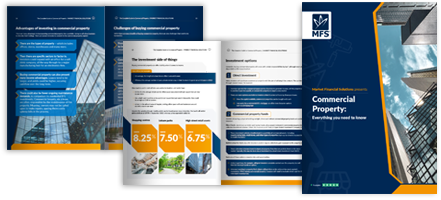Market Financial Solutions are a bridging loan and buy-to-let mortgage provider and are not legal, financial, investment or tax advisers. This document is for informational purposes only and does not, and should not be considered, to constitute legal, financial, investment or tax advice or be relied upon by any person to make a legal, financial, investment or tax decision. Therefore, Investors are encouraged to seek appropriate professional advice. The information in this content is correct at time of writing.

Energy Performance Certificates (EPC) are an important piece of the property puzzle. But what is the minimum EPC rating for commercial property, and why should investors care?
In a nutshell, EPCs indicate how energy efficient a building is, and gives it a rating. Buildings will be ranked from G (inefficient) to A (very efficient). These ratings will show how costly powering the property could be, and how high its carbon emissions may reach.
EPCs are needed whenever a residential property is built, sold, or rented and they are valid for 10 years from the date of issue[1]. Although, there are some instances where an EPC is not required. For commercial investors, this includes:
- industrial sites, workshops and non-residential agricultural buildings that do not use a lot of energy
- holiday accommodation that’s rented out for less than 4 months a year or is let under a licence to occupy
- stand-alone buildings with total useful floor space of less than 50 square metres
The certificates are produced by approved domestic energy assessors[2], who will highlight what changes could be made to a property to make it more efficient.
Commercial EPC ratings explained
Currently, there are commercial EPC[3] requirements for property owners who rent out or sell their business premises. The certificate will also be needed where buildings under construction are finished or; where there are changes to the number of parts used for separate occupation and these changes involve providing or extending fixed heating, air conditioning or mechanical ventilation systems.
Although, there are certain exemptions in place. An EPC is not required for commercial property if the owner can demonstrate:
- that the building is listed or officially protected and the minimum energy performance requirements would unacceptably alter it
- it’s a temporary building that will only be used for 2 years or less
- the building is used as a place of worship or for other religious activities
- it is an industrial site, workshop or non-residential agricultural building that doesn’t use much energy
- it’s a detached building with a total floor space under 50 square metres
- the building is due to be demolished by the seller or landlord and they have all the relevant planning and conservation consents
There are also exemptions in place for certain vacant commercial properties, and demolition plans. What’s more, if property investors feel they have been unfairly fined for not having an EPC available, they may be able to appeal the charge.
Currently, Minimum Energy Efficiency Standards (MEES) require that rented commercial properties have a minimum EPC rating of E[4]. From 2027, this minimum rating will be raised to C for commercial landlords, which is then set to hit B by 2030.
→ More insights to commercial real estate in our Complete Guide to Commercial Property.
What is the minimum EPC rating for commercial property going to be?
Landlords will not be able to continue with an existing tenancy if the EPC is below an E ranking. Under current plans, a C rating will be needed by 2027 and B will be the minimum from 2030.
Worryingly, it seems many commercial landlords will not meet these minimums over the coming years. Only an estimated 28% of commercial properties currently meet future minimum EPC standards, according to Office Principles[5]. Additional analysis from Search Acumen revealed full compliance with future commercial MEES standards won’t be achieved until 2040[6].
This is set to prove costly for many ill-prepared commercial landlords. Compliance with the standards is to be managed and assessed through two “compliance windows”. We are currently in the first window, where EPC documentation will be required from April 2027[7]. The second starts in 2028 and where landlords fall foul of the rules, they could risk fines of up to £150,000[8].
Still, the applicable fines may pale in comparison to how high the collective refurbishment bill may be if we leave it too late. In hitting the 2030 minimums, the cost to the UK’s industrial, manufacturing, logistics and warehousing property stock is expected to reach £30bn, according to Avison Young[9]. Meanwhile, Vital, the Better Buildings Partnership revealed improving a commercial EPC E to B costs £2,000 per 100m²[10].

How to improve your EPC rating – commercial property & residential homes
Fortunately, there are many options available to landlords to meet commercial EPC requirements and improve the EPC rating for commercial properties and residential homes alike. A good place to start with is insulation.
Poor insulation can be a major cause of energy loss. Especially for commercial spaces such as warehouses which tend to have large roofs and wall surface areas. This can be amended through upgraded cladding or refurbishment works which, initially, may prove expensive, but should be offset by lower energy bills.
Additional upgrades can also include better heating, venting and air conditioning systems. Energy efficient lighting upgraded glazing or investment in solar panels can all pay off down the line. A lot of planning may be needed for these upgrades, but there is plenty of support out there to help investors carry the burden.
Investors who are still unsure of what the minimum EPC rating for commercial property is, or of what they need to do moving forward can turn to public entities for guidance. The Carbon Trust offers independent advice on efficient energy usage for businesses and the installing of renewable energy sources. The Energy Savings Trust also has example case studies of best practices, along with other energy efficiency resources and events.
There are also a range of Government schemes which offer loans, grants, or subsidised energy-saving measures to support small businesses[11]. An example includes the Boiler Upgrade Scheme (BUS) which was historically geared towards residential properties, but can now also extend support to eligible commercial properties[12].
Also, Market Financial Solutions can provide investors with flexible bridging loans that can be delivered in mere days, should they need fast finance for renovation or refurbishment plans.
Why should you care?
So, property investors may be aware of the EPC rating for their commercial property, but is there any tangible reason to care? Even without the legislative backdrop, property owners could benefit from embracing environmental upgrades on their own initiative. Greener property may result in higher returns and/or lower costs.
Though is it possible to sell a commercial property with an EPC rating of F or G, investors will need to disclose it[13]. They might also be asked to make improvements to increase the property’s rating before selling it. So, if an investor’s commercial property has an EPC rating above G, they might have better chances to sell it or rent it out.
Improvements made to get higher EPC ratings and meet commercial EPC requirements could eventually result in higher rents, boosting revenues for owners and landlords. More efficient buildings could also cut utility costs and unexpected headaches. A new boiler may be less likely to break down than one decades old, for example.
Environmentally efficient commercial property could also hold a premium in the market. Some 92% of UK property investors say tenants will pay a premium for greener homes and commercial premises, according to Handelsbanken’s latest Property Investor Report[14]. Some 77% reported a surge in demand for heat pumps, solar panels, and electric vehicle charging points specifically.
What’s more, demand for commercial property in general is rising. Office, retail, and student housing demand is rebounding[15], with Rightmove recently revealing that demand for rental offices specifically has increased by 19% since the first quarter of 2024[16].
Its Quarterly Commercial Insights Tracker report found that modern office spaces with accessible amenities and plenty of open space are most sought-after, meanwhile office blocks with less energy-efficient infrastructures are struggling to meet workers’ expectations.

The Complete
Commercial Property Guide
Everything you need to know
- Extensive introduction
- Lease types
- Regulations & responsibilities
- Finance
[1] https://www.gov.uk/selling-a-home/energy-performance-certificates
[2] https://nationalcareers.service.gov.uk/job-profiles/domestic-energy-assessor
[3] https://www.gov.uk/energy-performance-certificate-commercial-property
[4] https://ignition.law/understanding-mees-regulations-what-tenants-need-to-know-about-energy-standards-in-commercial-leases/
[5] https://officeprinciples.com/insights/epc-for-commercial-property#:~:text=With%20only%20an%20estimated%2028,to%20prepare%20for%20upcoming%20changes.
[6] https://www.propertymark.co.uk/resource/non-domestic-property-risks-missing-2030-energy-targets-by-a-decade.html
[7] https://www.wjm.co.uk/focus/changes-to-energy-performance-certificates/#:~:text=2025%2D2027%3A%20Currently%2C%20if,would%20need%20to%20be%20presented.
[8] https://www.propertywire.com/buy-to-let/commercial-landlords-given-epc-deadline-warning/
[9] https://www.propertyweek.com/insight/upgrading-stock-to-mees-could-reach-30-5bn
[10] https://www.vitaldirect.co.uk/news/government-response-to-commercial-rental-mees-expected-in-2025/?utm_source=chatgpt.com
[11] https://www.ofgem.gov.uk/information-consumers/energy-advice-businesses/find-business-energy-efficiency-grants-and-schemes
[12] https://www.vitaldirect.co.uk/energy-efficiency-grants-and-incentives-for-uk-businesses-in-2025/?utm_source=chatgpt.com
[13] https://epchome.co.uk/commercial-epc-energy-ratings/
[14] https://www.landlordzone.co.uk/news/demand-for-green-rented-homes-soaring-say-big-landlords
[15] https://www.propertyinvestortoday.co.uk/breaking-news/2025/05/commercial-property-investment-rebounding-upbeat-new-report/
[16] https://www.commercialtrust.co.uk/news/commercial-property-market-at-pre-covid-levels/




